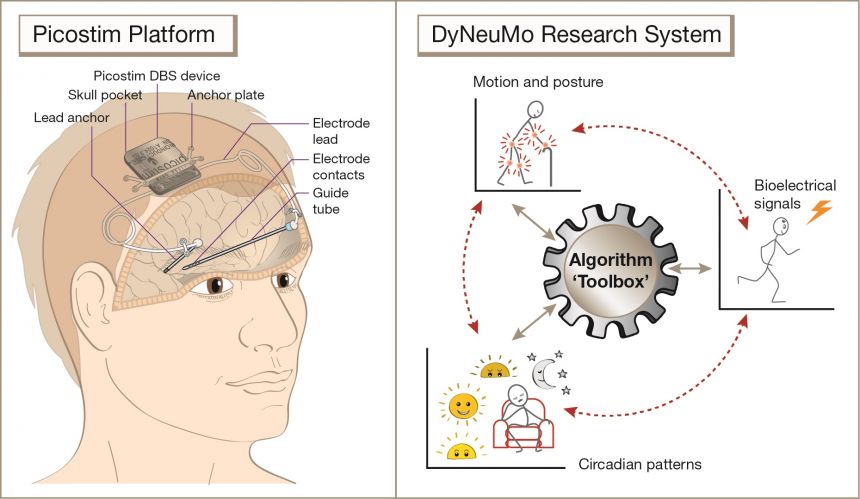First-in-human implant of a “closed-loop” bioelectronic research system
Monday 7th Feb 2022, 5.00pm
The study is a collaboration between Neurosurgery (Associate Professor Alex Green), Engineering Science’s Professor Tim Denison and a UK-based bioelectronics technology company, Bioinduction Ltd.
 First-in-human implant of a “closed-loop” bioelectronic research system for investigating treatments for brain disorders
First-in-human implant of a “closed-loop” bioelectronic research system for investigating treatments for brain disorders
The MINDS feasibility trial involves a 5-subject first-in-man clinical trial with the novel closed-loop brain pacemaker to target the pedunculopontine nucleus (PPN) stimulation in patients with MSA. The protocol uses an investigational research platform, called the ‘PicostimTM-DyNeuMo,’ which was developed in a strategic collaboration between Professor Denison and Bioinduction, Ltd.
The PicostimTM-DyNeuMo project embeds scientific instrumentation into the predicate small, cranialized PicostimTM brain pacemaker for exploring the role of circadian rhythms, motion, and brain signals in disease pathology and treatment. In addition to enabling basic clinical neuroscience, the PicostimTM-DyNeuMo can be configured to respond to physiological signals such as patient motion to explore therapy optimization.
The research team aim to identify biomarkers that signify the pathological state, and how these vary throughout the day/night cycle, and to ultimately develop ‘closed-loop’ stimulation patterns that optimise symptom management and improve sleep.
Professor Denison said: ‘Implantable stimulators provide a unique platform for enabling clinical neuroscience by providing 24/7 access to brain networks. Scientific instrumentation first serves to help understand disease pathology and can then be configured to prototype enhanced therapy options including customization for patient specific physiology and rhythms. The creation of fully implantable state of the art clinical research tools required cooperation between academics and industry to ensure the research instrumentation meets stringent regulatory standards, and the PicostimTM-DyNeuMo research tool is the result of symbiotic collaboration with Bioinduction leveraging their PicostimTM platform.’
Professor Alex Green added: ‘This is an exciting time for medical device research in the UK. In the past, often clinicians would explore new indications for existing technology whilst engineers would build new systems in parallel. This collaboration aims to integrate the development of innovative technology with exploration of mechanisms underlying disease states from an early stage and will therefore increase our understanding of disease at the same time as trying to treat it. It is also a prime example of a multidisciplinary collaboration, academia and industry all working together with the same goals and bringing their strengths to the table.’
Ivor Gillbe, director of Bioinduction stated: ‘This is an exciting time for Bioinduction and the UK bioelectronic medicines industry. Bioinduction’s mission is to enable a paradigm shift in the world of DBS implantations for those with chronic brain disorders. The team and partners have delivered a major milestone in the development of the next generation of elegant, evolutive cranialized brain pacemaker platform. Picostim™ harnesses state-of-the-art innovations and research enabling new possibilities to address significant unmet needs, initially focused on Parkinson’s Disease. Together, we can bring state-of-the-art neurotech innovation aiming to improve the outcomes for the chronic neurodegenerative diseases by accelerating advanced research in neuromodulation and bringing Picostim™ to the market for significant unmet needs in cerbrovascular and cognitive disorders.’
The trial is being supported by the University of Oxford and the Oxford University Hospitals NHS Foundation Trust, with input from Neurology (Dr Nagarajah Sarangmat) as well as Neuropsychology (Dr Simon Prangnell). Funding was provided from the UK government’s BEIS department through the Royal Academy of Engineering, the MRC Brain Networks Dynamic Unit, and the John Fell Fund at Oxford. Designed to be a configurable research platform, the team is now preparing funded trials using the PicostimTM-DyNeuMo in post-stroke chronic pain, epilepsy, and disorders of consciousness.
The PicostimTM and PicostimTM-DyNeuMo research platform are available for investigational use only and are not approved for use outside of clinical studies.
Deep brain stimulation (DBS) is an approved, safe, and effective treatment for patients with Parkinson’s disease with motor symptoms that cannot be adequately controlled with medication. Over 200,000 people worldwide to date have received DBS systems.
The Picostim™ DBS system is the world’s first miniaturized skull-mountable DBS system currently in pivotal clinical study ‘SPARKS’, the impulse generator (IPG) being one third of the size of conventional DBS devices. This is a rechargeable DBS device, where the Picostim™ DBS system has been designed to enable a faster, single-stage, implantation procedure.
Skull-implantation eliminates the need for tunneled extension leads. Employing the best available technology and practice, the implantation procedure for a chest mounted IPG typically involves between five and seven hours (Stereotact Funct Neurosurg 2013) of surgical time in a multi-stage procedure. Picostim™ can be implanted in a single stage, without removing the stereotactic frame used to accurately position the electrodes, allowing for more optimal and efficient surgical workflow.

